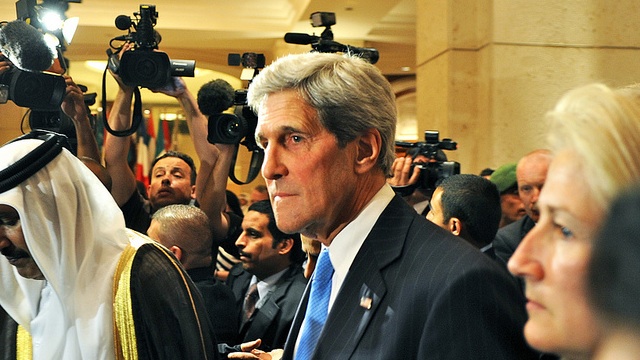SUMMARY
This is AI generated summarization, which may have errors. For context, always refer to the full article.

AMMAN, Jordan – US Secretary of State John Kerry held a second day of talks on Friday, June 28, aimed at reviving moribund Middle East peace negotiations, sounding out Palestinian president Mahmud Abbas in between two rounds of meetings with Israeli leaders.
Kerry, who is trying to break a protracted deadlock in the negotiations, met for 4 hours with Israel’s Prime Minister Benjamin Netanyahu in a Jerusalem hotel before setting off by motorcade at 1:30 am (Jordan time) on a two-hour drive to Amman.
“We had a good long meeting,” Kerry told Abbas over lunch, held at the Palestinian ambassador’s residence in the Jordanian capital.
“We’re going back,” he added, before departing again for Jerusalem — this time by helicopter — to meet Netanyahu and President Shimon Peres.
Officials were tight-lipped about Kerry’s meeting with Netanyahu, held over a dinner of red tuna and salmon ceviche at a hotel suite named after Israel’s slain peacemaking premier Yitzhak Rabin.
Kerry “reiterated his strong and sustained commitment to working with all parties to achieve two states, living side by side with peace and security,” a US official said on condition of anonymity, calling the talks “productive”.
Kerry has made Middle East peace a signature priority. Since the veteran senator and former presidential candidate became the top US diplomat in February, he has visited the region 5 times.
US officials have played down hopes of a breakthrough, but Kerry has said he wants progress before the UN General Assembly in September, when Abbas could rally international opinion against Israel if he sees no movement.
The immediate task is not a settlement to one of the world’s most intractable disputes but a much more modest goal — resuming direct talks between Israel and the Palestinians after a gap of nearly 3 years.
After the quick failure of the last round, the Palestinian Authority wants guarantees that Israel will freeze construction of settlements on occupied land and commit to the principle of a peace deal based on the borders that existed before the 1967 Middle East war.
Israel has retorted that it is ready to negotiate but will not accept “preconditions”. Just a day before Kerry’s visit, an Israeli committee gave final approval of 69 new settler homes in annexed Arab east Jerusalem.
While the United States was low-key in its reaction, Palestinian senior negotiator Hanan Ashrawi called the construction approval an Israeli repudiation of Kerry’s peace initiative.
US officials say they want to build a solid foundation for the peace talks so that any renewed negotiations are not just symbolic but have a real chance of moving towards a lasting deal.
Some ideas floated include a release from Israel of Palestinian prisoners jailed since before the 1993 Oslo peace accords, a gesture that could give Abbas more political room to negotiate.
Another possibility would be an informal agreement for Israel not to announce new settlements without explicitly declaring a freeze — a step that would go down badly in Netanyahu’s right-leaning government.
Netanyahu already had tense relations with President Barack Obama in the US leader’s first term over pressure to make peace. The Israeli premier emerged from January elections with coalition partners even more scornful of a peace deal.
Trade and Industry Minister Naftali Bennett, who heads the far-right Jewish Home party, recently described the Palestinian issue as “shrapnel in the buttocks” — a problem that Israel simply had to keep suffering through.
In an interview with the Maariv newspaper, Bennett threatened to quit the government if it agreed to create a Palestinian state but said he did not oppose negotiations as he did not think they would make any difference.
“Above all, I am not ashamed to say to everyone that the land of Israel is ours,” he told the newspaper, referring to a greater Israel including the occupied West Bank.
“We have to learn to live with a situation of no solution. When there is no solution, you don’t go off and kill yourself,” he said.
An opinion poll published by the Israel Hayom newspaper on Friday found that, while most Israeli Jews supported a resumption of negotiations, there was skepticism about whether they would achieve anything.
The poll found that nearly 70% of respondents were against confidence-building “gestures” towards the Palestinians, such as freeing prisoners and easing movement for Palestinian residents of the West Bank and the Gaza Strip. – Rappler.com
Add a comment
How does this make you feel?
There are no comments yet. Add your comment to start the conversation.